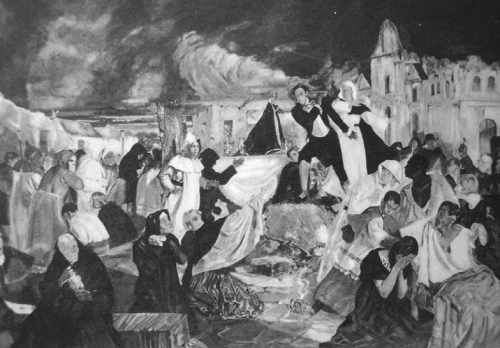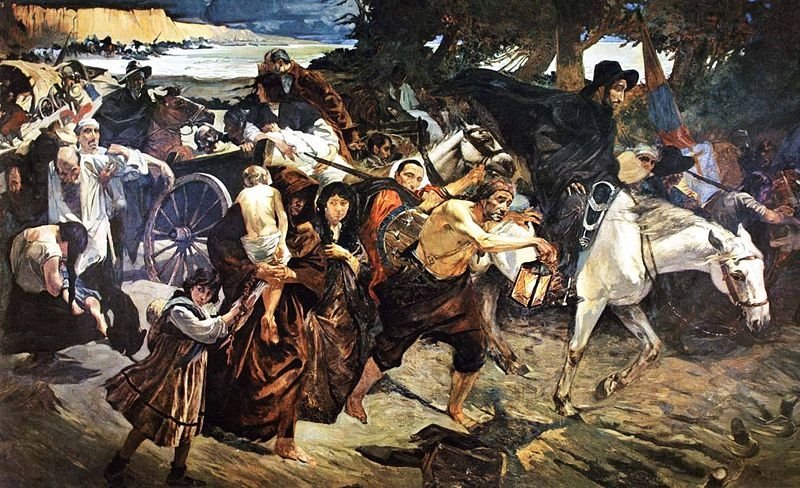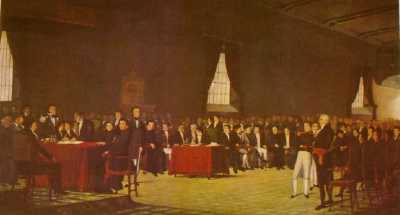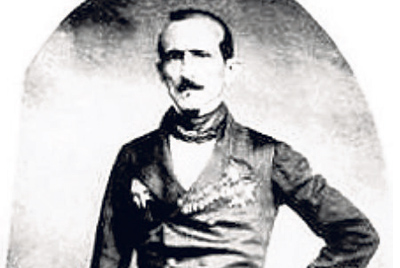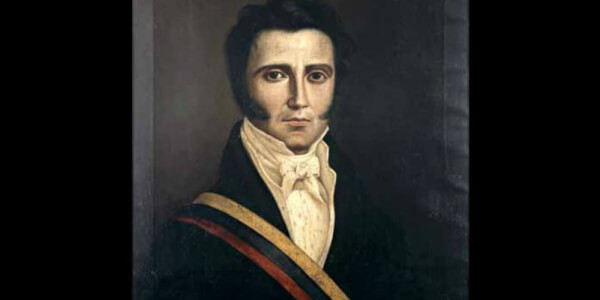THE GRAND CRISIS.
"Marshall Sucre was the victor of Tarqui, the redentor of the children of the sun, the man that broke the chains Pizarro put around the great Inca Empire. The future will remember Sucre with a foot on the Pichincha and the other in Santo Domingo, guiding la patria Colombia and comtempling the glory of the Americas he liberated"
-Simon Bolivar.
The Caracas Earthquake (September 1839) is considered one of the worst disasters in South America. The earthquake literally leveled the city, killing thousands, destroying industry, houses and infrastructure. Modern speculations say that the earthquake was so strong because it was full of saved-up energy that wasn’t liberated before for some reason. Others say that such speculations are ridiculous. Either way, the earthquake was a terrible event that represented a great loss of money, resources, and most importantly, people.
The earthquake couldn’t have come in a worse time for the Republic. The elections were close and both main parties, the Federalists and the Centralists suffered crises as a result of it. The Centralists because their power base was in Venezuela. The Federalists, who suffered the worse consequences arguably, because they were the ruling party and since the state of Venezuela was in no condition to respond to the situation, it was up to the Federal Government. The economy was doing fine before the earthquake, but Colombia had just had one of its most important cities destroyed and predictably the economy crashed.
Caracas Earthquake. Some people thought it was a divine punishment.
President Sucre tried his best to help Caracas but still poverty spread, leading to an increase in violence. The Centralist State government in Venezuela was also incapable of doing much due to being basically broke. However the greater obstacle to reconstruction wasn’t the economy but rather the fighting between the Centralists and the Federalists. The earthquake ended up becoming a political divide on whether a Federation was the correct form of government for Colombia due to just how ineffective the State and Federal governments had proven to be when it came to cooperating in times of crisis. Just like at the very start of the Independence Wars, the Centralists lobbied for greater Federal authority to deal with such crises. Of course, that would mean ending up losing their control over certain states, so they also wanted to impeach Sucre and/or call to elections. The fighting developed into inner-party fighting as well after some time, with some Federalists actually urging Sucre to resign and the Centralist being divided between the almost reactionary “Espinas” (in reference to Flores, they were “las espinas de flores” – the flower’s thorns) and the moderate “Marchitos” (the withered ones).
The Marchitos were led by the relatively young Ecuadorian senator Estaban Cruz. Cruz was born July 4, 1799 in Quito. As a young man he was profoundly impressed by the first attempt at independency that ended with the execution of all the Quitean patriots. Once the Independence Wars started he joined the army as a drummer boy. After Colombia’s independence was sealed with the Battle of Ayacucho, he went back to Quito, finished his studies, and became a newspaper owner, being especially prominent for being the one that revived Eugenio Espejo’s old newspaper. He initially joined the Federalist Party and was a member of the Colombian Lower House representing a Quito district between 1828 and 1834. He became disillusioned with the Federalist policies after it became obvious that they weren't really committed to Federalist principles but rather to liberalism. He supported the government during the Colombo-Peruvian War, becoming a firm Colombian nationalist. After the war, he was elected as a Senator in 1832.
Esteban Cruz, senator for Ecuador.
He joined the Centralists shortly before Flores took command and at first was thrilled with “new Centralist Party” but he became quickly known as a dissenter that, in his words “joined when the party represented the ideal for a greater nation, not for a tyrannical dictatorship”, Nonetheless, he remained in the party and surprised everyone by gaining a Senate seat in Quito, a city usually under the firm control of the Federalists until after the Colombo-Peruvian War.
He was hugely popular in Ecuador thanks to some highly successful industry and education projects he pushed for there during his congress terms. His letters reveal he had some ideas about forming his own party but didn’t want to do so until when in December 1839, three months before the elections, Flores introduced the Emergency Powers Decree (Decreto de Poderes de Emergencia) to the Colombian Congress. The decree would give extraordinary, almost dictator like powers to any governor or president who activated it. It may seem counterintuitive for Colombia’s greater opposition force to introduce a bill to increase the president’s powers, but the bill stated that once passed, the president could activate it without Congress approval. In other words, if passed the bill would allow Colombia to become a dictatorship rather easily.
Cruz immediately protested it and finally decided to start his own party: the National Conservative Party (Partido Conservador Nacional or PCN for short). Most Marchitos and the more conservative elements of the Federalist joined him. Thus, even though officially the Congress remained the same, it was now divided between the PCN, the Federalists and the Centralists with no party having a majority, The Decree was thus put down and Cruz, almost in revenge to Flores, drew up a new Decree that would allow Congress to dissolve Venezuela’s state government and put it under Federal (and Federalist) control until the earthquake damages were passed. The Conservatives and Federalists managed to negotiate a “onetime only” coalition and the bill passed. This was Cruz’s greatest mistake.
Pro-Centralist Caricature mocking the PCN.
The people of Venezuela mostly organized under the right-wing fanatical militia Sons of Bolivar (Hijos de Bolivar) rose up in rebellion. Their numbers were bolstered by the poor, unhappy people of Venezuela who believed in their populist rhetoric. This started a period know as “The Violence” (La Violencia). Destruction and murder skyrocketed and the police was powerless to stop it. The State congress was raided, the police quarters burned down and Federalists officers executed. Venezuela was now in a state of rebellion and anarchy. The Great Crisis had begun. And to top it all, election time came around.
Sucre decided to put the State of Venezuela and especially Caracas under martial law, which the Centralists protested. Still, with their government dissolved and also being under suspicion of being the main promoters of Sons of Bolivar (which, later historical findings showed, they were), they had to quiet down. The campaign was fierce and the nation was more divided than ever. In March the elections took place. In May the results were know: Sucre had 38,3% of the vote, Flores had 37,2% and Cruz 24,5%. No candidate had reached the majority of 50%+1 needed to win the presidency.
La Violencia forced many to leave the city.
Cruz may have been against the Federalists and their policies, but he despised what the Centralists had become and firmly believed that whoever had the plurality of the popular vote should be the president. Thus he arranged for yet a second Federalist-PCN coalition in Congress, which confirmed Sucre as president. Many PCN members saw this as a betrayal, especially because Cruz had assured them that the previous coalition was a onetime only deal. The Centralist also had a convincing argument in that Caracas had not been allowed to vote. Due to the constitution property requirements for voting, only one million of the eleven million Colombians were able to vote. Caracas had 50,000 voters, or 5% of the electorate. The Centralist thus claimed that had Caracas been allowed to vote Flores would have obtained the plurality and, under Cruz and many other’s beliefs, the presidency. Another contentious issue was that the Congress had remained as before the elections in order to vote on the presidency, still of being rearranged in accordance with the Congressional elections results (which similarly divided the Congress between the PCN, Federalists and Centralists).
The elections results did nothing to quell La Violencia, which continued. The Grand Crisis finally reached its breaking point when, during a trip to Caracas to try and control the riots, Marshall Sucre was assassinated.
The murderer, named Augusto Espinoza, was a fanatical Sons of Bolivar guerrilla fighter and Centralist party member who had managed to ambush Sucre while he travelled through a forest in his horse. Colombian infrastructure was underdeveloped and thus he had to go through certain steeples in horse. He was quickly captured and the fact that he was a Centralist hit the party hard. Marshall Sucre was after all a beloved hero from both the Independence Wars and the Colombo-Peruvian War, and it was widely believed that he had singlehandedly saved the fatherland during the latter.
"As a soldier you were victory, as a burocrat justice, as a victor mercy, and as a friend loyalty"
-Simon Bolivar.
The Government entered in an even more terrible crisis. The Constitution stated, very clearly that if the President was assassinated, the Vice President would take command of the government as the new President of the Republic. However, he had to be approved by Congress. The Federalist party was shattered by Sucre’s assassination and was left leaderless, growing too dependent on Sucre to effectively act. Santander was not an option either since he was extremely sick and almost unable to move. The Centralist Party was still strong under Flores, but their popularity had deteriorated enormously. The fact that upon Sucre’s death Bolivar, by now in Brazil, sent a letter to Colombia decrying his assassin and what the Centralists had become and even expressing shame on his former protégé, Flores, didn’t help at all. Flores, almost heartbroken by this, tried to destroy the letter, but Cruz got hold of it and published it in the Colombian national newspaper, El Colombiano. He then published another of Bolivar’s letters supposedly addressed to Santander asking him to do “whatever it took to ensure the Republic remained united”. There’s still some debate as to whether the latter letter was a forgery or not, but both letters accomplished their purpose.
A lot of Sons of Bolivar became dishearten at hearing that their hero was ashamed of them and that he supported the Federalists. Many militias, with the exception of the most fanatical ones, disbanded. La Violencia continued however as the Federal Government was in no position to act.
The PCN couldn’t arrange yet another “onetime only” coalition with the Federalist as doing so would probably cause it to collapse, therefore Vice President Arturo Roca couldn’t be confirmed and Colombia was left without a leader. The Congress then started bickering about who was to become the new leader. It was clear to everyone that nobody could really be declared leader due to not party having a majority or being willing to do a coalition, yet elections couldn’t be called either due to the same reasons. Finally, Cruz managed to convince Flores to vote for a Congressional election. In December 1840 the Congress was dissolved and elections carried and the new Congress was assembled in January 1841. Cruz’s gamble failed, no party gaining a majority either this time. Flores had had enough by then.
General Flores launched another coup d’état attempt in March 1841, declaring that Colombia needed a strong hand to guide her, and the political squabbles and petty fights weren’t fit for leading the nation. Thereby, he declared a new state, the Colombian State (Estado de Colombia) and called for a national convention to be hold in Maracay, Caracas itself not available due to La Violencia. However, just like Bolivar’s attempt 17 years earlier, Flores’ coup was not complete. Unlike Bolivar, whose coup was thwarted by Miranda, Flores’ coup was stopped because he didn’t manage to get the support of the entire army.
The Colombian Army was not very strong with the exception of the Ecuadorean Army, formally called the Army of the Southern District (Ejército del Distrito Sur, EDS), posted in the Peruvian border in order to respond should Peru ever invade again. This Army was under the command of General Lorenzo Rodriguez. Rodriguez is considered one of the greatest Colombian Army commanders. A wealthy Cartagena Criollo, he joined the militias at a young age. He ascended ranges quickly and became a commander. During the Independence Wars he was originally a royalist, but soon deflected to the patriots. He also participated in the Colombo-Peruvian War, during which he became a General. After Santander assigned Sucre as commander of the Armed Forces, Sucre decided to assign Rodriguez as commander of the EDS. He was not some kind of hero, of savior, but just a capable general loved by his men. He was widely considered to be the second in line to Jeronimo Jijon, the commander of the Armed Forces at the start of the Crisis.
Rodriguez held the firm belief that the Armed Forces should not intervene under any prospect in a country’s government, instead being a neutral protective force that ensured democracy and the people. After Flores’ coup attempt, the EDS decided to remain neutral just as Rodriguez wished. Being a beloved commander, not many attempted to join Flores anyway. Rodriguez then travelled to Santafe to meet Jijon and the other Colombian Army commanders. There, Jijon resigned and decided that, in lieu of a government, he could name his successor, choosing Rodriguez. Rodriguez thus became the next Commander of the Armed Forces.
Meanwhile all this happened, the Colombian Congress continued deliberations. Cruz argued, quite strongly, that the current crisis transcended political divisions and hypocrisies, and thus a National Government was necessary to pull Colombia through the Crisis. He proposed the creation of a Federalist-PCN coalition to govern Colombia until Flores’ State could be dissolved and the situation stabilized in Caracas and Venezuela. The PCN would only accept such coalition if they were the senior partners. Much to everyone’s surprise, the disorganized and leaderless Federalist Party accepted the deal but there was a catch: Cruz couldn’t be the interim president and had instead to form a provisional government and select a president for it. In the meantime Cruz became the quasi Prime Minister of a National Emergency Government (Gobierno de Emergencia Nacional, GEN).
Once news that Rodriguez was named new Commander of the Armed Forces, the GEN designed him as its leader, the President of the Provisional Government of the Republic (Presidente del Gobierno Provisional de la República) in May 1841. Rodriguez didn’t want the post, but he nonetheless accepted, believing it to be his duty to his fatherland. Cruz designed him with an almost unanimous vote because he believed Rodriguez to be an ambitionless, yet honest and hardworking man who didn’t fight for personal gain, but for what he believed to be the best for his people and his country.
Gobierno Provisional de la República de Colombia.
Rodriguez first action as President was to encircle Maracay and cut it off of all supplies. He then moved troops to Caracas and took a stronger stance to finally quell La Violencia. His main weapon, both against Flores and La Violencia was however economics. For Caracas, he brought two world recognized experts: British architect Edward Smith and French engineer Antonie Touraine. The Caracas Reconstruction Decree was signed into law in September and, protected by the Army, Smith and Touraine began to work in reconstructing the city. They promised the GEN they would transform Caracas into “the London of the Americas”. In order to finance the project a massive loan had to be taken from Mexico, who offered lower interests should Colombia cooperate with Mexico in its Imperial Treaties, specifically relinquishing control of the USCA. Colombia was in no position to hold onto it, so they signed the Treaties once the moment came.
Caracas economic situation started to improve slowly, and as industry started again in order to finance the reconstruction providing jobs and housing, La Violencia started to decrease. Caracas Iron Works and the Venezuelan Timber Company, both British funded companies destroyed during La Violencia, were re-opened, now staffed and operated by Colombians. Britain was a little angry for the fact, but Colombia offered further economic concessions on the Colombian Caribbean and Britain was too busy with problems in Ireland and North America to care.
The main problem continued to be Flores government in Maracay. The city was encircled and quickly ran out of supplies. Flores, initially popular, was now seen as a crazy man that had condemned “his” people to famine. His militias couldn’t do much and they soon ran out of bullets. He only governed de jure. The GEN didn’t do much after Maracay was encircled, because attacking the Colombian State was recognizing that there was a Colombian State to being with. Finally in Christmas the people of Maracay took to the streets. Most of Flores’ followers had already deserted him, knowing that there was no hope of winning because he only had a handful of militias while the entire EDS encircled the city. Finally, and to save himself from being lynched by the population of Maracay, Flores surrendered and was taken prisoner. He would be executed for high treason a few weeks later. The Caracas Reconstruction Decree was then extended to Maracay.
A last photo was taken of Flores before he was executed.
With Flores and his attempt at a new state finally defeated, General Rodriguez immediately called for a Constitutional Convention to be held in Santafe to decide the future of the Republic. After months of deliberation the Third National Constitution (Tercera Constitucion Nacional) was approved by the Convention. Like the Second National Constitution before it, the Third Constitution maintained mostly the same political system, the most important changes being the elimination of midterms to ensure a President wouldn’t be impeached during the middle of his term, a clear delimitation of presidential succession, a reorganization of state governments and their duties and relation with the Federal government to ensure a quick response was possible in times of crisis, economic reforms, relaxing of property rules for voting and rules for obtaining citizenship, the extension of La Guardia de Honor and (mostly due to Rodriguez) army reorganization decrees that, for example, banned serving soldiers or officers from interfering or participating in the Colombian government in any capacity. The Third Constitution as a whole centralized Colombia and gave major power to the Federal Government, which the Convention managed to do because of widespread approval by the population. Some parts are nowadays considered misguided, but it managed to stabilize Colombia and prevent any crisis of such magnitude from ever arising again.
Elections were called in April 17th. The Centralist party had ceased to exist, thus leaving only two parties in Colombia: The Federalist Party and the National Conservative Party.
In May the results came. The PCN, which came to be seen as the party that saved Colombia and managed to guide it through the Crisis, gained a majority in both Congress Houses and State Governments. Of help was that Rodriguez had stated that the PCN was probably the most important party at the moment, due to the Federalists being ineffectual and weak. Of course that was twisted to mean that Rodriguez, now a beloved hero as well, was a proud member of the PCN. Santander, still sick, also praised Rodriguez and personally met him to congratulate him on “saving his fatherland”. Rodriguez didn’t consider himself a hero and would soon retire to a quiet life in Hispaniola.
The most important part of the election was of course the presidential election. And in May 24, 1842, after taking an oath in the Palace of Government, Estaban Cruz became the new president of the Republic of Colombia.
Esteban Cruz, 4th President of the Republic of Colombia.
_________________________________
[AN]What can I say, Flores was not an exemplar character by any means. After the dissolution of Gran Colombia he became the first president of Ecuador and, frankly, did a bad job. He had some crazy ideas about installing a monarchy in Ecuador by the way... As for Sucre, I simply love him. He was an outstanding man. He actually declined to be president for life of Bolivia and gave a lot of money to the poor and oppresed. It pains me to kill him.
